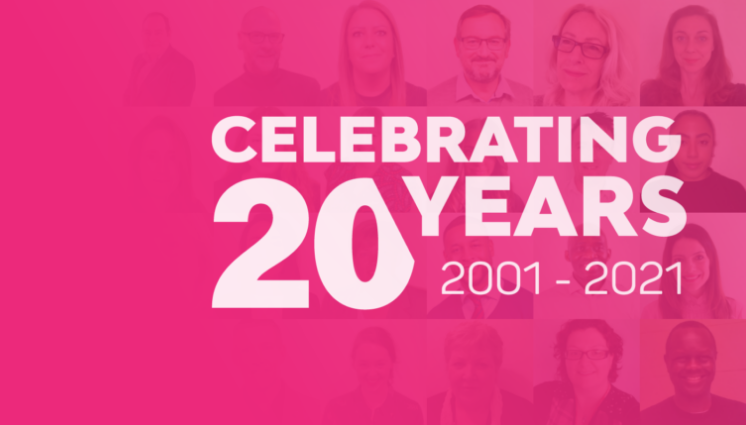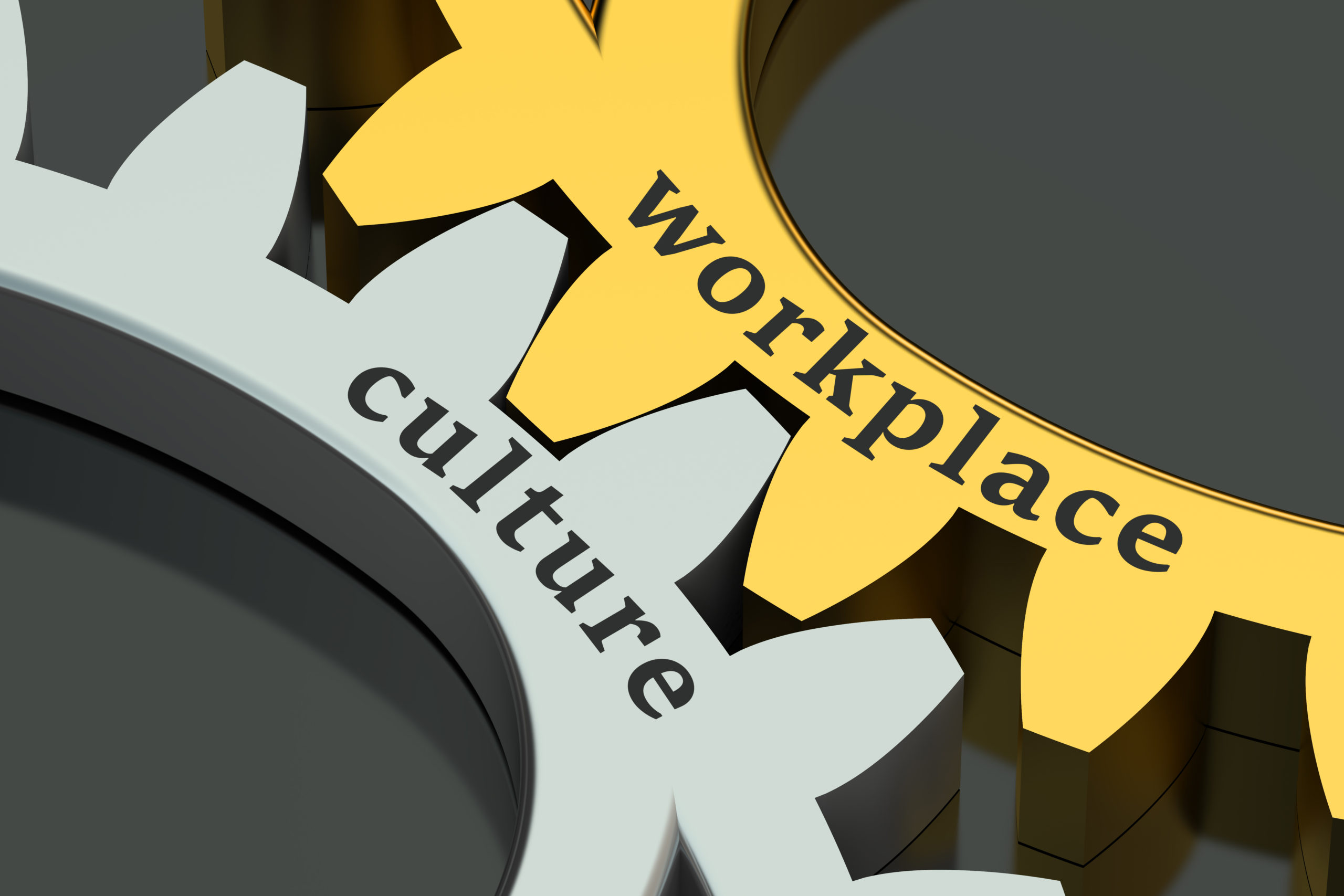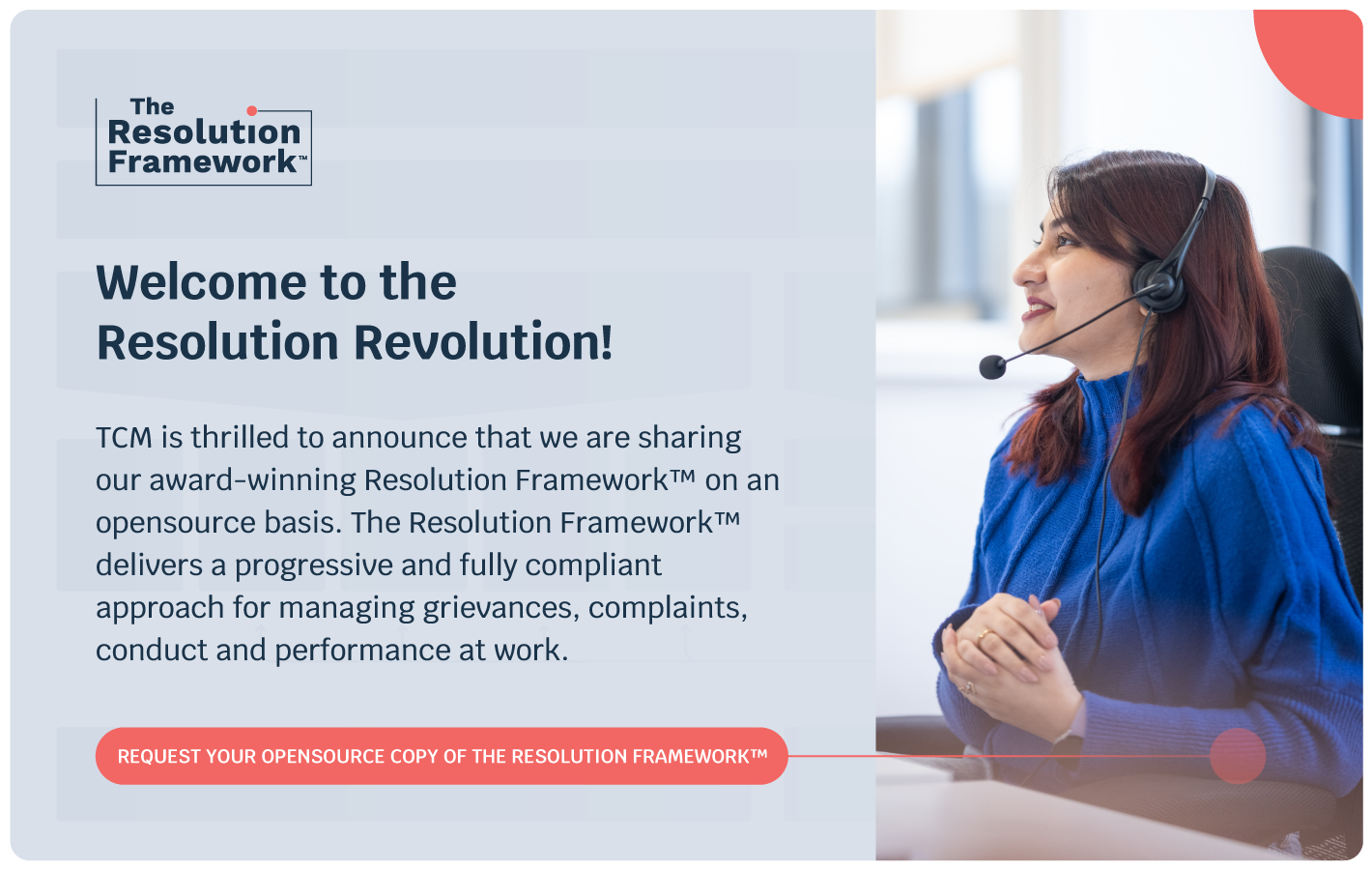
Share article:
Tags:
The Alternative Policy
When I first heard David Liddle, CEO of The TCM Group, speak back in 2013 at the Law Society event where he was launching what was then called The Model Resolution Policy™, little did I know it would lead me to working for his company!
I had taken on the role of HRD for a large healthcare provider and had inherited a significant grievance burden. Complaints and issues were regularly ‘thrown over the wall’ to HR to be managed through the organisation’s Disciplinary & Grievance (D&G) policy and procedures. I knew instinctively this approach was not working; it was costing us time, money and was emotionally like being on a roller coaster – with no ups! The adversarial, combative D&G procedures simply created MORE problems that they were resolving.
Sitting in the Law Society that fateful date in 2013, listening to David speak about the Model Resolution Policy™ was a total revelation to me. I had never heard about the use of mediation in the workplace as an alternative to D&G management and yet knew I wanted to do something different and innovative to manage the often heavy (and costly) grievance burden more effectively. The lightbulb had been turned on!
Throwing out the old procedures
On my return to work, I threw out the old grievance policy and procedures and implemented the TCM Model Resolution policy and procedures in its stead. The grievance burden literally vanished in a matter of months. It worked so well, when I moved roles in 2015, I implemented it again. By this time, the TCM Model Resolution Policy had grown up and developed into the Model Resolution Framework™. It now included a far wider range of resolution solutions and pathways complementing everything I had previously known under the old Resolution Policy.
Since then, the Resolution Framework has continued to evolve, and now incorporates Formal Resolution to replace the old disciplinary route; the legal compliance is still very much present, but the approach and language is resolution focused, inclusive and just. There are also new inclusions such as the introduction of a Resolution Unit who manage routes to resolution; a Resolution Index to triage the requests for resolution; and Resolution Champions who fulfil a role to support, advise and advocate for those seeking resolution.
After 20 years in the making the TCM Resolution Framework™, offers organisations large and small the opportunity to revolutionise their old HR people management policies and procedures and in so doing, they will positively transform their culture. The lightbulb that illuminated my thinking back in 2013 at the Law Society has not only remained on, but it is burning even brighter!
Having taken the time to look back over my resolution journey, it quickly became clear, what a powerful impact mediation has had, within the organisations I’ve worked with, and for our employees. As is fitting with the celebration of The TCM Group’s 20th anniversary year, below I share my 20 benefits of mediation. Many of these extend far beyond the process itself, and some may well surprise you!
1. Mediation provides a lasting resolution to workplace conflicts.
Within a structured mediation approach, the outcomes are not determined by a third party, but 100% developed collaboratively between the parties in conflict; outcomes that reflected the language, needs, and goals of the parties involved, and which ensure their shared accountability for making what they have agreed actually work. What could be more beneficial?
2. Mediation improves working relationships.
Inside a mediation, the parties really must listen to each other. They must open their minds and hearts to understand how that conflict has impacted on the other person and through that honest dialogue, they develop a deep and shared understanding of each other’s needs.
This helps them to gain a fuller appreciation of the impact of that conflict both personally and professionally. They lean into the adult-to-adult engagement in a situation that almost certainly may have been more childish and childlike.
3. Mediation helps resolve the fear of the parties in conflict.
Relationships that are broken or fractured are often grounded in fear.
Imagine, if you can, the feelings of the parties in conflict. Imagine how they feel, going to work each day, knowing the difficult or uncomfortable situation they are facing is waiting for them. Without mediation what can they do? Traditionally they can only consider the old route to an outcome, namely the discordant, egregious grievance procedures.
The weight of that conflict on their shoulders is immense. Whether they are the person raising the grievance, the person who is the subject of that grievance or a witness called forward to attest to the grievance, conflict is a heavy load to bear. Mediation can offer a route to lasting resolution that all parties can benefit from.
4. Mediation saves money.
How much does a grievance cost in real terms? The time, translated to costs, is huge. Acas reported recently that the cost of conflict to UK organisations was £28.5 billion. If that is the case, why do we continue to pursue traditional procedures as a route to resolving conflict in the workplace?
Mediation and early resolution would have addressed most, if not all, of those conflicts. ACAS provide a conservative estimate that mediation sits at roughly 1/3 of the cost of a formal procedure. The financial savings can be huge!
5. Mediation reduces stress.
If you’ve been involved in a grievance procedure, or any negative process, I can guarantee that during that time in your life you did not feel positive, happy, in control and stress free. This is caused by cortisol- the stress hormone. The effect of cortisol can disrupt sleep, promote depression and anxiety, increase blood pressure, and contribute to fatigue and foggy brain (aka cloudy thinking).
Through mediation, you can reduce cortisol production, free up your conscious mind to focus on positive outcomes that leave you feeling in control of the situation. That feeling is empowering!
6. Mediation helps increase productivity.
Imagine, if you will, you have two team members in conflict with each other. The drop in productivity is almost instant.
Mediation addresses the root causes of conflict and de facto, productivity will return to pre-conflict levels AT LEAST! It may go higher as the positive reinforcement achieved through mediated outcomes can make people work smarter and with greater focus.
7. Mediation generates kindness.
Participating in mediation requires the parties to treat themselves and others with kindness – kindness towards each other and towards themselves.
The impact will be positive mindsets, openness to collaboration and ultimately, a workplace infused with kindness must be a better place to operate and will be one where everyone flourishes!
8. Mediation delivers innovation.
When people are in conflict their minds narrow, focussing only on the conflict. This means innovation and creativity significantly drop.
After mediation, when resolution is achieved, the minds of the parties previously in conflict open up; creativity and innovation are restored. The best time for new ideas and creative ‘juice flowing’ can often be immediately after a mediation.
9. Mediation develops our decision-making skills.
When mediation has been successful, the parties’ brains are better able to focus and concentrate on the present moment – which can help them make more rational and balanced decisions. Making the right decision at the right time enables the team and the business to enjoy success.
10. Mediation has benefits on our Immune system.
Research has found that meditation can increase electrical activity in the left side of the brain – which helps the immune system act more efficiently and produce more defence cells.
A Healthier immune system = healthier bodies = reduction in absence due to health issues. Win-Win!
11. Mediation makes staff more resilient.
When in conflict, people’s resilience drops dramatically. They become susceptible to ill-health, anxiety, low mood, and any slight challenge or obstacle, at work or outside, can be a huge challenge.
Through mediation, they can learn stress coping and management strategies, enabling them to deal with emotional triggers or stress in the workplace more effectively.
12. Mediation is a leadership development tool.
By increasing self-awareness, emotional intelligence, and positivity, meditation can make a huge impact on a person’s presence in the workplace and help them become a better leader for their team.
13. Mediation builds team cohesion.
When team members are in conflict, their cohesion and ability to work collaboratively is interrupted. Mediation can and does restore the balance, enabling cohesive working and collaborative, partnering once more.
14. Mediation leads to a reduction in absenteeism.
When people are in conflict, they often need to remove themselves from the environment where conflict is present. That is the workplace. When they can address that workplace conflict, they feel more comfortable and able to be in the workplace which ceases to be a place of pain, anxiety, and grief, and becomes a place of safety.
15. Mediation helps organisations to avoid legal claims.
How many employees have progressed a situation to Employment Tribunals because they felt un-heard, dissatisfied with the grievance or disciplinary outcomes meted out by their employer?
Early resolution, valuable dialogue, and mediation, if used, can head off the potential of claims and saving time, money and reputation.
16. Mediation helps improve staff retention levels.
The recent Acas report suggested that UK employers lose approximately £11.9 billion from resignations. Identifying and addressing problems early on can help prevent unnecessary resignations or dismissals.
17. Mediation delivers faster and more positive outcomes.
Traditional, old, adversarial policies and procedures, such as grievance, disciplinary and performance, can take an inordinate amount of time and energy, let alone cost. A typical mediation can be completed in just one day, offering a much faster route to resolution.
18. Mediation allows for ownership of outcomes.
No one tells the parties in mediation how to resolve their conflict. They develop their own outcomes and agree on how to implement them. That ownership means the parties share a vested interest in making things work and, importantly, making lasting change.
19. Mediation aligns with your organisational (and personal) values.
Many organisations have a set of values that they espouse as being the way they want people to operate. Equally, people have their own personal values through with they operate.
Through mediation, values are brought into alignment. Parties can discuss and explore how their values were affected or compromised inside the conflict. The agreements they achieve via mediation can allow them to align their personal values with those of the organisation.
20. Mediation allows you to champion resolution within your organisation.
The most vocal and passionate champions of mediation and resolution are those who have benefited themselves from it. Gandhi said ‘be the change you want to see in the world’. What better way than being the champion and advocate for mediation because YOU have experienced its power and positive impact.
Request your Free Copy of the Resolution Framework
In celebration of our 20th anniversary year, and in recognition that there has never been a more pressing need to move away from our destructive HR policies and procedures, we are currently making the Resolution Framework available, free of charge, to organisations across the UK. Please complete the form on our homepage, to request your copy today.










